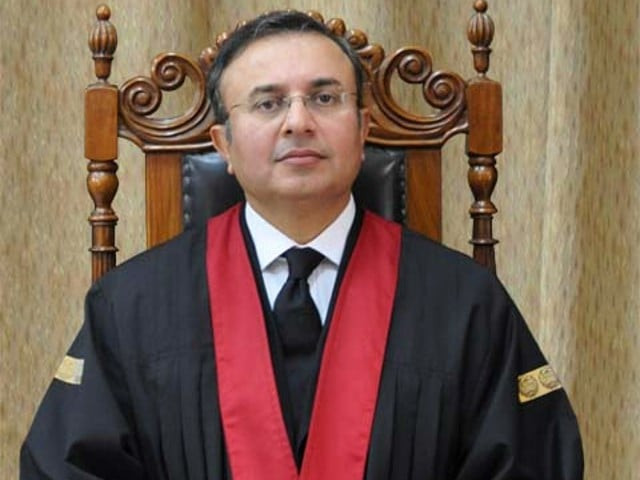Justice Syed Mansoor Ali Shah. PHOTO: LHC
ISLAMABAD:
The Supreme Court, quashing an order of the KP service court, ruled that marriage cannot deprive a woman of an appointment under the quota reserved for children of public servants who die or become incapacitated while in service.
“If the marriage of a son does not disqualify him or interrupt the flow of financial benefits to the family, there is no rational basis to hold that the marriage of a daughter should have that effect,” reads a 10-page judgment written by Justice Syed Mansoor Ali, while directing the concerned department to reinstate the petitioner’s appointment with all arrears of benefits.
He wrote the ruling while resolving an issue: whether marriage can disqualify a daughter from being appointed within the framework of the quota reserved for the children of officials who die or become incapacitated during service.
“The relief provided for by the norm reaches the family through the designated child, whether son or daughter, and the marital status of the daughter has no link with the object of the norm. Any interpretation that denies this opportunity violates the guarantees of equality and non-discrimination provided for in articles 25 and 27 of the Constitution and perpetuates a stereotype that the Constitution itself rejects,” the ruling reads.
The petitioner’s mother, Farakh Naz, was an employee of the Education Department, Government of KP, who retired from service on medical grounds on April 27, 2022. Consequently, the petitioner was appointed as a Primary School Teacher (Basic Pay Scale-12) in Government Girls’ Primary School, Tatar Khel, Karak District, Khyber-Pakhtunkhwa, under the quota of deceased or incapacitated employees under Rule 10 (4) of the Khyber-Pakhtunkhwa Civil Servants (Appointment, Promotion and Transfer) Rules, 1989.
The petitioner was performing her duties, when the District Education Officer Karak suddenly withdrew the order of appointment of the petitioner without issuing a show-cause notice, saying that the benefit of appointment under the quota is not available to a woman who has entered into marriage.
The petitioner approached the KP Service Court but her plea was dismissed. A division bench of the apex court comprising Justice Shah and Justice Aqeel Ahmad Abbasi has noted that the rule provides for appointment of a child of a deceased or incapacitated public servant to provide financial relief to the affected family in recognition of the parents’ service to the state.
“Its purpose is not to assess the dependency or economic condition of individual children but to ensure that the benefit of employment reaches the family of the official who has died or become incapacitated during service.
“In this context, a son and a daughter are on equal footing. Both can convey the desired economic relief to the family, and the choice of either of them fulfills the objective of the Rule. The assumption that a daughter, by reason of her marriage, ceases to be related to or concerned with her paternal family is erroneous and based on outdated social stereotypes.”
The court has noted that “we must also strongly dispel, once again, the regressive notion reflected in the clarifications issued by the Establishment Department of the Government of Khyber-Pakhtunkhwa, which states that a married woman is no longer “a burden” on her father.
“Such a statement is deeply insensitive, because it depersonalizes women. The very use of the term “responsibility” to describe a woman reflects a rigidity of patriarchal thinking that has no place in our Constitution. We are surprised that such a term can reach official correspondence in the 21st century, even more so in a republic that constitutionally guarantees equality, dignity and respect to all its citizens regardless of their gender.
The ruling notes that the Constitution is gender-neutral in its recognition of fundamental rights and does not establish any distinction between a man and a woman, or a son and a daughter, in the enjoyment of their rights (article 25).
“In fact, it goes further and consciously discriminates in favor of women by ordering the State to adopt special measures for their protection and advancement (articles 25, 27 and 34).”
“This constitutional framework recognizes that women have historically faced systemic disadvantages and therefore deserve additional support to ensure substantive equality. However, despite this constitutional protection, the petitioner has been denied her legitimate right to the quota reserved for the children of a father who is deceased or incapacitated by marriage, a denial that is in stark contradiction to both the text and spirit of the Constitution.”




